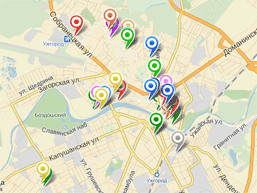Department of Clinical and Laboratory Diagnostics and pharmacology
Challenges on directed activity as development opportunities
Necessity in human microbiome researches
Most modern approaches to P4 medicine are based on today's proven represantations that a personal microbiome is the key to the formation and maintenance of personal health, and thus a tool to prevent a number of infectious and non-infectious diseases.
The problem of microbiome research is the complexity of tracking its daily changes due to exposure and interaction the total amount of various external factors on us.
The concept of "normal" oral or intestinal microbiome is extremely difficult to characterize also due to the fact that the diagnostic is not only the determined ratio of different representatives of the microbiome, but rather its functioning or "functiome".
Our scientific research is precisely aimed at:
- development of the comprehensive approach for assessing and taking into account local (epigenetic) risk factors in the differentiation of microbiome of any individual;
- creation of food composition databases as one of the most powerful microbiome modulation factors;
- elaboration of bioinformatics approaches for correct interpretation of features of individual microbiome for the purpose of early diagnosis of noncommunicable diseases (obesity, type 2 diabetes, cardiovascular disease, juvenile depression, etc.);
- development of new pharmaceuticals (pharmabiotics) and innovative functional food products directed appointment with proven clinical efficacy and with predefined properties;
- ustification of the possibility of personalised nutrition;
- a proposal for a new strategy for the prevention and treatment of diseases, taking into account the stratification of patients and the use of new generation biomarkers.
The main tasks directly executing by staff of the department are briefly described below.
New generation biomarkers are based on the search of correlationally related characteristic ratios of indicators of one or another state only for a particular individual and considered the set of parameters such as:
1) an individual microbiome;
2) biochemical indicators;
3) immune status relevant to age, sex;
4) mental health, stress level;
5) physical activity;
6) socio-economic status;
7) food preferences.
Tasks over which the staff works:
- the correct mathematically-verified probable interpretation of human clinical data, limited cohort data or results with directly opposite data and recommendations;
- the complexity of the structure of food products and, therefore, it is unlikely to provide accurate prediction of the expected effect on correction of a human microbiome, which is linked or modulated through an immune response to the state of the whole organism;
- correct interpretation of a person's microbiome data;
- creation of adequate databases;
- the search for a synergy between "environmental" (all types of pollution, such as pesticides, antibiotics, as well as poor nutrition of plants and other external factors) and actually "individual" (behavior, food culture, socio-economic status, education) factors that are additionally affecting on the unique individual characteristics, physiologically defined by "genes", mental health, body constitutions, etc.
Necessity of implementation of IT and development of bioinformatics
The interpretation of certain data microbiome data with other relevant and decisive factors (evidence-based and correlative biomarkers, age, gender and personal health status, personal nutritional needs, food composition data, lifestyle specifics, cultural preferences, environmental conditions), and also necessity in consideration of the available literature data and analytical characteristics of ethnic food products and an innovative approach to the food industry that should be offered to local farmers and producers of local products can be carried out exclusively with the help of bioinformatics.
In addition, it is important to create a food composition databases. Application of the latter would help development:
- national nutrition strategy;
- food safety;
- sports nutrition;
- catering;
- a healthy lifestyle;
- food industry (for example: product development and food labeling);
- personalised nutrition.
Thereby, it would be possible to harmonize a large amount of data that includes all essential aspects of human health and other relevant databases through methods and tools of machine learning.
The social aspect of our scientific research work is our contribution to the development of the circular bio economy in the Zakarpatska oblast as the basis for increasing the economic potential, environmental sustainability and the growth of the number of jobs.
The regions that have foreseen the bio economy as a major thriving sector in their smart specialisation strategies or in comparable strategic roadmaps provide their sustainable and progressive development for years. Processes in recycling resources (rural biomass and organic wastes) to be intended to innovative chains (BBPs bioplastics, bioenergy, second generation biofuels, biofertilizers) – and in our case, is a raw material of biologically active substances that are part of the pharmabiotics.
Відповідальний за інформацію: БОЙКО Надія Володимирівна
Дата оновлення інформації: 12.03.2019













